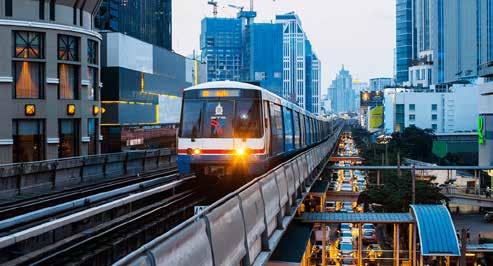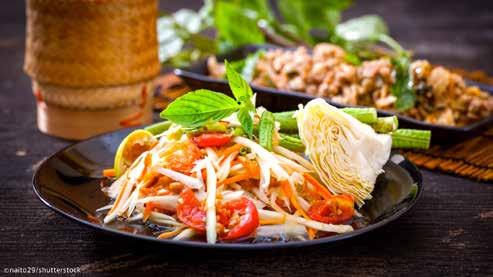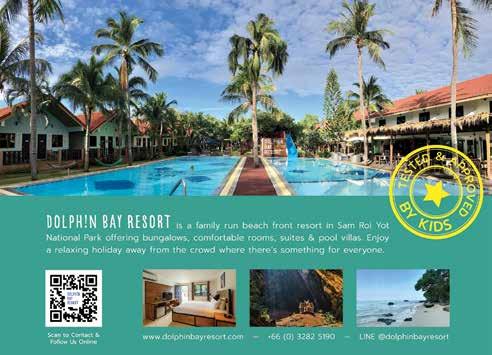
10 minute read
Thailand Expat Guide 2020
THE BASICS
EMERGENCY NUMBERS
Police and general emergency - call 191
General Emergency - call 911
Medical emergency - call 1669
Tourist Police - call 1155
EMBASSY CONTACTS
Royal Danish Embassy Sathorn South Soi 1 Bangkok 10500 +66 (0)2 343 1100 bkkamb@um.dk www.thailand.um.dk Ambassador: H.E. Jon Thorgaard
Embassy of Finland Athenee Tower, 14th Floor 63 Wireless Road (Witthayu) Lumpini, Pathumwan Bangkok 10330 +66 (0)2 207 8700 sanomat.ban@formin.fi www.finlandabroad.fi Ambassador: H.E. Satu Suikkari-Kleven 191 911 1669 199 1155
Royal Norwegian Embassy UBC II Building, 18th floor 591 Sukhumvit Road, Soi 33 Bangkok 10110 +66 (0)2 204 6500 emb.bangkok@mfa.no https://www.norway.no/thailand Ambassador: H.E. Kjersti Rødsmoen
Embassy of Sweden One Pacific Place, 20th Floor 140 Sukhumvit Road (between soi 4 and 6) Bangkok 10110 +66 (0)2 263 7200 - 1 ambassaden.bangkok@gov.se https://www.swedenabroad.se/sv/ utlandsmyndigheter/thailand-bangkok/ Ambassador: H.E. Jon Åström Gröndahl
Danish Kroner 20.83
Swedish Krona 29.2
Norwegian Kroner 30
Finnish Euro 2.8
MOBILE PHONES
The first thing you need is a Sim card with data transfer and some phone time. You can get that in any shop of the three main providers: True, Dtac or AIS. You will often find them in department stores. Don’t forget to bring your passport. You may need help from a local with setting up the language setting your phone so you can read your emails and surf websites and applications online, but mostly it works automatically.
INTERNET
With the spread of smartphones the number of internet users in Thailand has exploded and is probably today over 50 million people - although the vast majority don’t think of themselves as surfing the internet, but only playing with their phone!

Currently, True is the largest regular internet companies are AIS, DTAC, or 3BB. True provides home entertainment services with their True Move service as well. To find a Wi-Fi spot in most restaurants or - for more mobility - buy a USB plugin that includes Wi-Fi access from your laptop, tablet or mobile phone. In Thailand they call them “aircards”. If you bought a local sim card, you can also use your phone as your internet gateway either using Bluetooth or your data/charger cable.
LANGUAGE
If you plan to stay for six months and above you find a Thai language course near where you live. Do this as soon as possible because if you learn from friends and taxi drivers to say “turn left”, “turn right” and “where is the toilet”, you feel less of an urge to take this course. Soon your progress with the Thai language will come to a stop if you don’t take a systematic approach.
Thai, or more precisely Central Thai, is the national and official language of Thailand. It is spoken and understood by all Thai people. But for many, their local dialect will remain their first language. Although most words are the same, these dialects will have a different sound and many of the words will be quite different from Central Thai. The Thai language is tonal and has a unique script with far more characters than the western alphabet. It has also three relational markers which help the Thai reader understand how the word is pronounced.

Some words in Thai have roots back to Pali, Sanskrit and Old Khmer. Some words have been assimilated from Chinese and recently, many words have been adopted from English, however these borrowed words are often used with a convenient abbreviation that makes it hard to recognise.

The most famous word adopted from French is the Thai word for all whiteskinned foreigners, “farang”. The word comes from the Thai pronunciation of the country France, “Farangcet”.
TRANSLATION
Google translate is quickly emerging as a good source of online translation from Thai to English or from English to Thai.
Online, the following services are free: thai-language.com and thai2english.com, which are really good.
There are are also several handheld devices specifically developed to translate from Thai to English and from English to Thai, often with sound option. You will find them in the electronic department of any department store.
For official translation of documents, there are many small and inexpensive service operators in the main tourist centres of Thailand.
WEATHER
Thailand has a tropical climate, high in both temperature and humidity. April and May are the hottest months of the year. June brings the Southwest Monsoon and the rainy season until October. From November to the end of February, there is a cooling North East breeze and a reduction in the humidity level. It is always much cooler in the north where the temperature may occasionally drop to as low as 2°C.
For coastal weather, this website is great: http://www.buoyweather.com/map/ gulf-of-thailand
CULTURE
The Thai culture incorporates cultural beliefs and characteristics indigenous to the area known as modern day Thailand. It is coupled with much influence from ancient India, China and Cambodia, along with the neighbouring prehistoric cultures of Southeast Asia. It is influenced primarily by Animism, Hinduism, Buddhism, as well as by later migrations from China and southern India.


FOOD
The Thai cuisine is the national cuisine of Thailand. Blending elements of several Southeast Asian traditions, Thai cooking places emphasis on lightly prepared dishes with strong aromatic components. The spiciness of Thai cuisine is well known. As with other Asian cuisines, balance, detail and variety are of great significance to Thai chefs. Thai food is known for its balance of three to four fundamental taste senses in each dish or the overall meal: sour, sweet, salty, and bitter.
THAILAND NEWS
Thailand has a rich mix of English language media and even a few in various Nordic languages.
The most comprehensive Nordic news website is www.scandasia.com. It serves news daily for Scandinavian residents in Thailand and other countries in South East Asia. For residents in Pattaya, there is a Norwegian newspaper and a Nordic magazine apart from the local pattayapeople.com website.
The local news service in English is very good:
Bangkok Post www.bangkokpost.com/
The Nation www.nationmultimedia.com
Thai PBS in English http://englishnews.thaipbs.or.th/
Khaosod in English www.khaosodenglish.com
VISA REGULATIONS
In the spring of 2020. the Covid-19 crisis blocked for a while foreigners completely from entering Thailand. Then certain categories of foreigners were gradually allowed to enter on various conditions. This gradual opening was at time of editing not yet completed.
Before the crisis, the following rules applied:
1. Visa on arrival
If you are sure that you will not stay over 30 days in Thailand, there is no need to apply for a visa. Passport holders from all the Nordic countries will get permission to stay for 30 days if they arrive at an airport and 15 days if they arrive at a land checkpoint. Conditions are: a) your passport must be valid for at least 6 months on the day you enter b) you have proof of onward travel (confirmed air, train, bus or boat tickets) c) you have enough money to support yourself during the stay.
2. Tourist Visa
The Tourist Visa can be applied for at any embassy or consulate general outside Thailand. Applicants should submit a completed application form with a recent photograph. The application fee is 1,000 Baht (subject to change without notice).
Arrival with a Tourist Visa to Thailand gives you permission to stay up to 60 days if you arrive by air. If you arrive overland you may be refused entry if you have just stayed 30 days on a Visa on arrival prior to applying for the tourist visa, so it’s better to fly.
3. Education Visa
Students at Government approved educational institutions can apply for a non-immigration ED (Education) visa. You can also start by coming to Thailand and then enroll in the school you choose. Often, students select the Thai language course. The school offers to handle all the paperwork, but most or all of the tuition fees must be paid up in advance. An education visa costs 2000 Baht (60 USD, 40 EUR - subject to change) paid to the Thai Embassy or Consulate. The tuition fee is not included in these fees.


4. Business Visa
If you want to work in Thailand, you will need a Business visa (non-Im ‘B’). You have to apply at an embassy outside Thailand. The easiest is to start from your home country, but if you are already in Thailand, we suggest applying at the Thai embassy in Singapore. The Royal Thai Embassy, Singapore has introduced Electronic Visa Application (EVA), so visa applicants must fill out the application forms, submit and check application status online. Applicants start by logging into the website http://www.thaiembassy. sg/visaonline/
The most important paperwork you need are: a) letter from your Thai company stating your position and salary. b) corporate registration papers from the employing Thai company. c) A WP3 letter from Ministry of Labour that your future employer will get for you. It is a kind of pre-approval of your work permit once you come into Thailand on your Business Visa.
A business visa does not allow you to work in Thailand but is the first step needed to apply for a work permit. Additional paperwork is needed if you intend to work as a teacher. The schools know what to provide and will hand you a bundle of documents for submission to the embassy.
5. Non “O” Visa
Applicants who have married a Thai national and wish to stay with their Thai family in Thailand can apply for a Non “O” visa. This type of visa is also the visa you need, if you wish to do volunteering work with the state enterprises or social welfare organizations in Thailand.
6. Retirement Visa
Those over the age of 50 can apply to live in Thailand for one year at a time using a retirement visa. The application starts with obtaining a three-month retirement visa, also known as an “O-A” visa. Before you buy a home, consider in the beginning to rent a property instead.
To qualify for a retirement visa you need to have the following documents: a) Copy of your passport b) Passport photos c) Letter from bank showing 800,000 Baht deposit, or d) Proof of 65,000 Baht a month income e) Criminal record clearance from country of origin f) Medical certificate g) Completed application form

Attorneys can come in handy during the process especially if you want to bring some of your personal items from your home country which is one of the common issues that create confusion.
The financial requirements can be a combination of both income and fixed deposit. This needs to be calculated for you.
VISA RUNS
Most foreign visitors to Thailand are granted a 30 day stay upon entry via airport, or 15 days via any land border if they arrive without a visa. Extending such a tourist visa without leaving the country costs 1900 baht and it is not possible to get more than one (1) week.
For visa runs, Malaysia and Singapore are good destinations. There are frequent, inexpensive flights to and from Thailand, and there is no tourist visa fee or tourist
visa application process for arriving in these countries.
PERMANENT RESIDENCY
Applying for Permanent Residency in Thailand requires you to have the following criteria: a) Must have had a Thai non-immigrant visa for at least three years prior to the submission of your application. b) Must be a holder of a non-immigrant visa at the time of submitting your application. c) Must be able to meet one of these categories: • Investment category (minimum 3 - 10 Mil. Baht investment in Thailand) • Working / Business category • Supports a family or Humanitarian Reasons category: In this category, you must be having a relationship with a Thai citizen or an alien who already has a residence permit as a husband or wife; father or mother; or a guardian of a Thai child less than 20 years of age. • Expert / Academic category Other categories as determined by Thai Immigration
You should note that the list of required documents for the application depends on the category under which the application is made.









